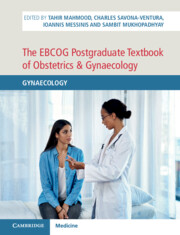Book contents
- The EBCOG Postgraduate Textbook of Obstetrics & Gynaecology
- The EBCOG Postgraduate Textbook of Obstetrics & Gynaecology
- Copyright page
- Dedication
- Contents
- Videos
- Contributors
- Preface
- Section 1 Basic Sciences in Gynaecology
- Section 2 Menstrual Disorders
- Section 3 Reproductive Endocrinology and Infertility
- Section 4 Contraception and STIs
- Chapter 20 Hormonal and Non-hormonal Contraceptives
- Chapter 21 Female and Male Sterilization
- Chapter 22 Management of Unintended Pregnancy
- Chapter 23 Recurrent Vulvovaginitis
- Chapter 24 Sexually Transmitted Infection and Pelvic Inflammatory Disease
- Section 5 Post-Reproductive Care
- Section 6 Vulva and Vagina
- Section 7 Cervix
- Section 8 Uterus
- Section 9 Ovary and Fallopian Tubes
- Section 10 Operative Gynaecology
- Section 11 Public Health Issues in Gynaecology
- Section 12 Miscellaneous
- Index
- Plate Section (PDF Only)
- References
Chapter 24 - Sexually Transmitted Infection and Pelvic Inflammatory Disease
from Section 4 - Contraception and STIs
Published online by Cambridge University Press: 24 November 2021
- The EBCOG Postgraduate Textbook of Obstetrics & Gynaecology
- The EBCOG Postgraduate Textbook of Obstetrics & Gynaecology
- Copyright page
- Dedication
- Contents
- Videos
- Contributors
- Preface
- Section 1 Basic Sciences in Gynaecology
- Section 2 Menstrual Disorders
- Section 3 Reproductive Endocrinology and Infertility
- Section 4 Contraception and STIs
- Chapter 20 Hormonal and Non-hormonal Contraceptives
- Chapter 21 Female and Male Sterilization
- Chapter 22 Management of Unintended Pregnancy
- Chapter 23 Recurrent Vulvovaginitis
- Chapter 24 Sexually Transmitted Infection and Pelvic Inflammatory Disease
- Section 5 Post-Reproductive Care
- Section 6 Vulva and Vagina
- Section 7 Cervix
- Section 8 Uterus
- Section 9 Ovary and Fallopian Tubes
- Section 10 Operative Gynaecology
- Section 11 Public Health Issues in Gynaecology
- Section 12 Miscellaneous
- Index
- Plate Section (PDF Only)
- References
Summary
This chapter discusses the STIs chlamydia, gonorrhoea, Trichomonas vaginalis (TV), genital warts, herpes, Mycoplasma genitalium (MG) and pelvic inflammatory disease (PID). HIV and syphilis are not covered. Chlamydia, gonorrhoea, TV, herpes and MG are diagnosed by PCR or NAAT testing. Warts and PID are predominantly diagnosed clinically. Management of all STIs involves discussion of information, both verbal and written, and advice on prevention by use of condoms and contact testing. Chlamydia, gonorrhoea, TV, MG and PID are managed by use of antibiotic regimens, which are described. Test of cure (TOC) is recommended for certain STIs (i.e. Gonorrhoea and MG) due to risk of antibiotic resistance. Treatment options during pregnancy and breastfeeding are discussed. Complications of the STIs where relevant are discussed.
Keywords
- Type
- Chapter
- Information
- The EBCOG Postgraduate Textbook of Obstetrics & GynaecologyGynaecology, pp. 186 - 202Publisher: Cambridge University PressPrint publication year: 2021

